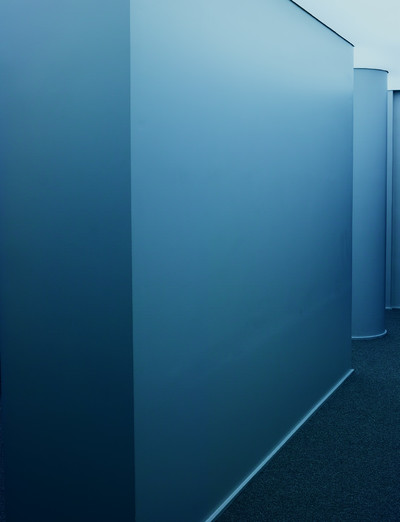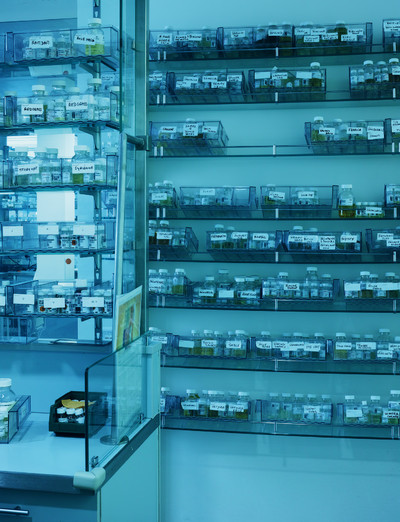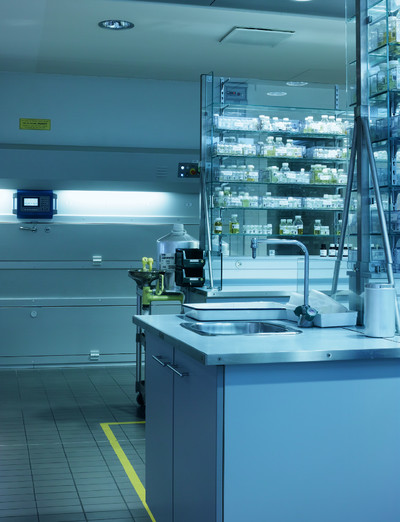Daniela Andrier makes the perfumes that make us elegant.
By Jonathan Wingfield
Photographs by Mario Palmieri
Daniela Andrier makes the perfumes that make us elegant.
When System decided that each of its four cover stars should have her own specially designed perfume impregnated onto the cover band, the obvious ‘nose’ to approach was Daniela Andrier. As perfumer for Givaudan, the global fragrance leader, Andrier has created some of the most elegant scents in recent times for brands such as Bulgari, Bottega Veneta, Maison Martin Margiela and, perhaps most significantly, Prada, for whom she has conjured up practically every perfume over the past decade.
Born in Heidelberg, Germany and now based in Paris, Andrier studied philosophy at the Sorbonne before opting for a career in perfume. Despite suffering from chronic sinusitis as a child, her prodigious ability to blend olfactory ingredients that stir the most profound of emotions has led to a stellar career in the global perfume industry, and has been awarded the Ordres des arts et des lettres by the French Ministry of Culture.
Where much of today’s in-your-face perfumery is as regressive as it is aggressive, Andrier’s creations are an exercise in restraint and subtlety. And when you consider that 1,500 new fragrances were launched in 2013 alone (in that same year, the fragrance market generated 34 billion euros), subtle scent is as anomalous as it sounds – and smells. As Andrier herself charmingly put it: ‘It’s like being in a quiet little seaside paradise that’s surrounded by superyachts.’
To accompany the four olfactory wonders that she’s created exclusively for System: Eau de Stella, Eau de Liya, Eau de Lara and Eau de Saskia, Daniela Andrier graciously invited us in to both her Parisian home studio and to Givaudan’s fragrance laboratory to discuss what she calls her ‘struggle against inelegant perfumery’.
Jonathan Wingfield: Do you have a first olfactory memory?
Daniela Andrier: I have lots, and they’re all important to me. In the work of a perfumer, these references in your memory are like markers that you constantly refer to – almost like an alphabet. One of the very first olfactory memories is linked to a cream that you find in Germany, Penaten-Creme, which has a wonderful scent and is used on babies’ bottoms. I remember that scent perfectly; it is like a magical trigger to the past. For me, it’s the fragrance of maternity and the pleasure that comes from being taken care of.
You recall this from being a baby?
Yes, it’s so powerful because I really was a baby at the time; I can see myself lying down and being dried after a bath and having the cream put on me. It’s a good example of my connection with smells and how significant they are to me; they have always been my means of communication with the world.
Was smell already the most developed sense for you as a child?
Yes, but without recognising it. When I was small, I put a coffee bean in my nose because I loved the smell of coffee and wanted to be engulfed by it. It got stuck up my nose, and I had to go to hospital to have it removed. Everything for me had an odour. As a child, I took these smells and turned them into a parallel language. The language of words and letters is spoken and explained whereas the odours of life just are beyond explanation. A flower that smells good, smells good; there is no filter. Smell is extremely sincere and truthful; nothing is manipulated, hidden or dissimulated.
‘When I was small, I got a coffee bean stuck up my nose. I loved the smell of coffee so much that I wanted to be completely engulfed by it.’
Do the smells from your childhood play an important role in the perfumes you’ve since gone on to create?
Well, I’ve never tried to replicate the notes in Penaten-Creme, but it has a connection with the slightly balsamic notes that I’ve since found again elsewhere. There are smells that I continue to use that are nearly all linked to childhood experiences in Italy. What’s more, I work almost entirely with Italian brands; I didn’t decide that, that’s just how it’s worked out.
Why Italy in particular?
Italy is the birthplace of my joie de vivre… I was born in Germany, but between the ages of about four and seven, we’d spend two months every summer in Italy. The flavours, smells and sensations that have touched me most come from Italy: happiness, food and wonderful fragrances such as pine needles on the ground warming in the sun, the smell of the sea in the near distance, sheets smelling of lavender and iris. Those particular notes are a complete obsession for me.
So you have always associated smells with happy times?
Above all, with life. And I generally have no olfactory memories associated with sad things. There are no smells I associate with my mother’s death. I’d asked to see her when she passed away – I was 13, and she was 42.
Is that universal? Does the brain have a means of filtering out those smells associated with sad things?
That’s very hard for me to answer. It’s such a personal thing. There are probably people who only have memories of terrible smells, of horrible experiences. Personally, I have images of sad things, but not smells.
Both Proust and scientists have explored this extraordinary rapport between smell and emotional memory. How do you define or indeed rationalise it?
I don’t rationalise it; I’m on Proust’s side because his writing touches me. I’ve obviously read scientific texts; I find them interesting, but I’m less touched. There’s a Proust phrase I really like: ‘Je le trouvai tout bourdonnant de l’odeur des aubépines.’ He’s describing a path: bourdonnant [humming] is the word used to describe the noise insects make, as if the pathway is humming with the fragrance of the hawthorn. The notion of ‘humming’ here is beautiful, as if the flowers are little insects re-sowing new flowers – something that refers to life.
Poetry linked to smell is important then?
Yes. For me, smells allow us access to something very poetic. And this links to time: the time we are here, what came before us, our own history, what is it about the past that determines the present; the relationship to love, what we loved and what we love now; the continuity and intermittence of feelings. For all these things, I think perfume is the long-term common thread.
Like a moving time capsule.
It’s like an amazing time travel agent that takes you into the past. But it isn’t simply about nostalgia; it’s not like when you go to the house where you once lived, and it’s not the same colour anymore, or the garden has changed. You only partially find what you knew, whereas smell remains extremely loyal.
It’s a complete experience.
Yes, because I find photographic memory incomplete. Photography will give you faces, physics, narrative, but it’s only an image, and it doesn’t tell you anything about feelings. It’s only the camera’s field of vision you see: you don’t see the person who took the picture or what is behind them; you can’t sense the sadness or happiness that surrounds that field of vision. For me smells are a more sincere and precise encapsulation of what you felt at that moment, they allow you to connect with a broader emotional memory.
Perfume has a great capacity to take us beyond a memory created through photo albums or what our parents tell us. It’s difficult to separate what we remember and what we’ve been told, but olfactory memories cannot be created artificially. Just because your mother told you something smelled like that, it doesn’t automatically become a memory for you.
‘Photography gives you faces, physics, narrative, but it’s only an image. For me, smells allow you to connect with a broader emotional memory.’
Do you consider your nose as a gift?
I think we all have the capacity to smell and record smells; I don’t think one nose is more competent than another. But I do think that we perfumers have a sensitivity that is much more developed than most people. Until I found out this job existed, I thought that everyone had the same relationship with smell. It’s only later on in life that we start realising we don’t all perceive things in the same way. Childhood conflict stems from the fact children think everyone lives in the same way: that noise is the same for everyone, that pain is the same for everyone, that cherries taste the same for everyone… Personally, I thought that everyone had this same relationship with smell; it was only when I was an adult that I realised it wasn’t the case.
When did you first become aware of perfumes?
There were family references of course: my father wore Eau Sauvage, my mother Calèche and Rive Gauche, as well as a Chloé perfume from that time. From a very young age, I’d visit perfume shops as a girl in Germany. And then later in Paris, I would go to Galeries Lafayette and smell all the new perfumes; there were many less products at the time, but I knew every single one perfectly. My first boyfriend came from a very traditional French family and they all wore Guerlain perfumes: the mother wore Shalimar, the sister wore L’Heure Bleue. For my 17th birthday he bought me Chamade, which I adored. His father wore Eau Sauvage just like my father, and he himself wore Pour Homme by Yves Saint Laurent, which is an extraordinary perfume.
How do you react today when you walk past someone wearing one of those perfumes?
It affects me a lot, still to this day. Rive Gauche is the most powerful of all as it was my mother’s perfume. But it is always a happy feeling.
At what age did you discover that making perfumes was a profession?
I was 22 years old. A lady I met at a party said to me, ‘I wanted to be a perfumer but I couldn’t because I have chronic sinusitis.’ I too had chronic sinusitis from the age of 15 – I had terrible allergies – and the moment she said this to me was like a revelation. I said to myself, ‘I will become a perfumer and for me the sinusitis won’t be a problem.’ I decided there and then. It was amazing, like this sort of ultimate confidence that arrived with that moment. Luckily, I ended up doing a desensitisation to dust mites, and the allergies passed.
What was your first step to getting into perfume making?
My mother often dressed in Saint Laurent in the 1970s, so when I discovered this profession, I naively thought that it was Saint Laurent himself who created his own perfumes. So I called the Saint Laurent offices and said I would like to be a perfumer. They told me they weren’t perfumers and that I should go to a school in Versailles called ISIPCA. At the time I was studying philosophy, and ISIPCA told me I had to do two years of chemistry before I could go there. By chance, a friend of mine met Jacques Polge the Chanel perfumer, and thanks to him I got an internship at Chanel. It really was luck. I was at Chanel in 1988, when I was 24.
Did Jacques Polge recognise your gift for smell?
He was very encouraging and seemed to think that there was a good chance I would make it. Without him, I don’t think I would have had such a smooth career path. I did my internship with him, then went to Grasse to study, then went to Robertet, a perfume company in Grasse. It was there I won my first perfume – for an Italian brand.
Italian brands from the very start.
It’s funny, it’s always been Italy! I then became the assistant of a perfumer called Edouard Fléchier, who had created Poison for Dior. He was someone who had a true perfumer’s style and character. He would smell my work and say, ‘Take that out, you don’t need this, make it simpler.’ It was all about simplifying, and that is something that’s always stayed with me.
‘The recurring theme in today’s big perfume trends is gourmandise, with too much sugar and patchouli. It’s more than a trend it’s a tidal wave.’
How do you define your role as a perfumer: is it a trade, a craft, an artistic practice?
For me it borrows a lot from artistic activities – there are lots of parallels between music and painting and perfume – but I wouldn’t ever consider myself an artist. You do however get that anxiety of creation, the fear of the blank canvas. There are days when it just flows in abundance, others when there’s a void.
To what extent do you consider creating perfumes a commercial exercise?
Of course I want success – I want the brands to be successful, so I respect their codes – but I don’t want to make uninteresting perfumes that simply follow the current market trends. When people wear my perfumes, I want them to tell them something; for it to be more than just a perfume from a known brand that is indistinguishable from many others.
Are there any particular tendences in today’s perfumes?
The recurring theme is gourmandise. There’s too much sugar and patchouli, but it works. It’s more than a trend; it’s a tidal wave. It’s like being in a quiet little seaside paradise that’s surrounded by superyachts. I try to make perfumes that can be moving, but that also pass the test with consumers. With Infusion d’Iris, women have told me it’s as though their own personal memories are captured within a perfume.
Considering all the emotional significance tied to scents, do you think perfumers have a responsibility?
Absolutely. I think our responsibility is to nourish people’s emotions. We no longer associate individuals so much with certain perfumes, because so many people wear the same thing. It’s great creating perfumes that represent four per cent of the market, but you need to find the right balance.
Does subtlety still have its place in the market today?
I think so. If it’s well marketed, with the correct packaging and so on, then you could have a lot of success. If you’re not going to push the marketing then you have to have a perfume that enchants people. There is no advertising for Infusion d’Iris – it’s never on television, or in the cinema and rarely in the press – but it has many loyal fans. It has a capacity to provoke an incredible love for it.
But this seems like an exception.
I think the market will become increasingly segmented: there’ll be the big names with big strong perfumes that last a whole day, with television ads that make all the promises, to be rich, in love and so on. And then there’ll be luxury perfumery for people who don’t want to be smelled from ten metres away, where more money is spent on the production than the advertising.
What I’d love to talk about now – something I know very little about in fact – is the actual perfume-making process…
Well, it’s never the same.
That’s what I find interesting.
You have certain clients, big groups with a lot of brands, who will develop some perfumes without a specific brand in mind. If the perfumer works blindly on, say, an oriental perfume, it gets tested and retested, and after four years it will end up in a bottle. But at no point has the perfumer worked towards a specific brand perfume. Personally, I cannot work like that. I need it to be for something, for someone. I am given a brief by the client; the person who has the licence.
Can you tell me about the brief… is it a written description or visual?
I’m usually given information such as: it’s a major women’s launch for 2016, it has to express the brand’s values, we need it to be floral, this is the budget, this is the deadline… But ultimately, you ask a perfumer to give their vision.
So it’s not so much a description…
Less so now. The perfume briefs I’d get in the 1990s were almost comically descriptive. I remember one saying, ‘This is for the woman who’s never been unfaithful to her husband, but is soon going to be.’ Fortunately the clients returned to a more sincere approach once they discovered that didn’t work.
‘Perfume briefs in the 1990s were comical: “For the woman who’s never been unfaithful to her husband, but is soon going to be.”’
How do you go about expressing the DNA of a particular fashion house through a perfume?
I work by empathy: I’m trying to give a scent to a world that I see before me. But it’s also a fantasy about what that world represents. So when it comes to a brief, well with me at least, there’s very little information, because what I’m being asked to transcribe is that very specific fantasy. What I create for Prada, I could only create for Prada. What I create for Bulgari is very different because it’s inspired by a different brand with different people; it’s specifically inspired by precious stones. Then Bottega Veneta is a very precisely written brief, an olfactory narration. But as I said, another client may simply say, ‘This is the brand. This is the budget. Do what feels best. Present it in three weeks’ time.’
When you get given such a vague brief, what do you start with?
Generally these days, I start with my own archives and references. It is very intuitive work. Perfumes are a song I’ve never sung before. It is like getting very close up to a beautiful-looking bird – that’s always an image that comes back to me – you can observe it very closely and see all its beautiful colours, but you mustn’t move too close or it will fly away.
Do you have a woman or man in mind when you create a perfume?
No. From that first moment of creation, it’s very intuitive, something that comes in little spurts, like a painter. I’ll find a name – you have to find one for the development period – then I go to work. I start by trying a variety of things all based on a structure that was there right from the beginning, and which is totally free. It comes from a ‘trip’. I don’t like that term, but that is where it comes from. It’s done with lots of love and intuition and empathy; I can’t describe it any other way because it’s very mysterious even for me.
Beyond that, the work comes from experience: things that I know how to do, what goes together, what won’t work. Then there are aesthetic choices that are totally subjective…
…that reflect your personal taste.
Exactly. Experience, experimentation and something almost childlike: how about we try this, this could be fun… Of course, all this is guided by the client’s opinion, which is obviously very important. The first thing I propose comes from the heart, and after that it gets reworked based on my experience, my tastes, experimentation, comments from the client, comments from the people I work with at Givaudan who are professionals in perfume, and then finally consumers’ tastes. The client leads me to the perfume form that is the most comprehensible for the largest audience – it’s a lovely collaboration.
Is the first time you share the perfume with a client done face to face?
Yes, in person. It’s something sacred, in the sense that you are presenting something you’ve created and it’s important to see how people react. You’re impatient for that reaction.
If it’s not quite what they wanted does that hurt?
It happened a lot when I was younger, these days hardly at all. That’s experience and working with the right people. When people actively seek to work with you then it means they like your approach. When you’re young you want to please everyone, in general. You haven’t yet made any choices, and it’s harder to defend your ideas.
You mentioned the three-week deadline. Is this typical, or can it be longer?
The three-week deadline is only for the first submission. The development period varies hugely depending on the client; I can develop a perfume in two months or over two years. I’m better at deploying my ability to sprint rather than run a marathon. It’s exciting when it has to be now, I feel like it’s more important. And when I’m working on the final stages of a perfume, I’m in a very loving state. I devote my time exclusively to one thing, so I become most creative.
Is there much back and forth between you and the client?
It can be every week for a year. It can reach twice a week during intense periods. They’ll say the top notes are missing something nice, it’s missing a smile – two hours later they’ll say there’s a hollow. After six hours they can’t smell anything at all.
It’s often said that all variations of musical notes have been exhausted. Is it the same case for perfume?
The history of perfume is 3,000 years old. But its current form – that revolution in perfume when we moved away from only using essential oils to developing synthetic scents – has only existed for a century. And couturiers developing perfumes dates back only 50-60 years. So it’s a brief history that hasn’t been exhausted. Plus, there are new raw materials constantly being developed. At Givaudan we’re researching, constructing, inventing, producing; we have the patents for molecules captives which bring new facets to existing families of scents.
‘I don’t like it when people say this is a masculine fragrance and this is a feminine fragrance. If they can’t be worn by anyone, they just become clichés.’
So there is still the possibility of creating a perfume revolution.
Well, perhaps more evolution than revolution. Eau Sauvage, which is a synthesis of jasmine, was a revolution, and there has been a whole lineage of perfumes that have descended from it. It’s true that in this, albeit short, history, everything can be more or less classified. But when you think about L’Eau d’Issey by Issey Miyake, which personally I don’t like aesthetically but which provoked a revolution with its marine notes and sea spray notes: it was a total break from everything that came before it. When Thierry Mugler’s Angel came out, nothing had existed before like that. Yes, there was sweet amber and patchouli aspects to it, and yes there are similar oriental perfumes that already existed, but there was also the caramel scent which brought a new dimension.
Completely new and innovative things are rarely the most beautiful. Plus, today’s innovation is much more regressive: it’s become something that reassures us and reminds us of things we eat, childlike things.
So as consumers we’re drawn to what we already know.
When you ask consumers what they like, they’ll chose the most familiar option. There’s a German expression: ‘What the countryman doesn’t know, he will never eat.’ So when you make a perfume, you need to find a way through that familiarity, either with a reassuring, beautiful or elegant emotion that avoids all the diktats of the day.
Do you conceive men’s perfumes differently to women’s?
No, not at all. I don’t like it when people say this is a masculine perfume and this is a feminine perfume. I think that perfumes should be worn by anyone. They are lovely fragrances that can work for a man or a woman. When it really is for a man or for a woman then for me that’s a cliché. And so there’s a lack of freedom.
Do certain perfumes react differently on different skins?
There are some skins on which a perfume smells terrible, due to sweat, acidity, what you eat, creams you use, dryness and so on. You also have skins that render all perfumes magnificent.
Once one of your perfumes has been accepted by the client, do you play any role in its marketing or the imagery?
No, only in the storytelling to identify the best ingredients in the perfume to highlight and market, because using them all would be confusing.
What’s your general opinion on perfume marketing?
I don’t believe you can sell a perfume with falseness, when marketing tries to tell stories that simply aren’t true. You have to respect the consumer as someone who is able to understand and who doesn’t need a sensationalist story told to them. What should make them dream is the scent itself, not the olfactory description. Marketing often feels the need to underline this sensationalist side. ‘It’s the best…’ ‘The greatest…’ It doesn’t come from the moon; it is only a perfume.
What about the imagery associated with perfume marketing?
I think it’s a complicated relationship. I myself am a manipulated consumer. But marketing isn’t what I prefer about the evolution of society.
What are your thoughts on perfume being so often linked to beauty, sex appeal and power?
For me it means a lot: a beautiful perfume is what envelops a person. A woman who wears a perfume that a man likes will be very sexy and desirable.
Is it the same thing for beauty?
I think so. A beautiful woman who enters the room and who has a lovely presence and whose perfume suits her… it’s part of a whole. While marketing promises wealth and lovers and power, it doesn’t bring you love. However, if you meet your love then you are highly likely to associate their perfume with all those things.
Do you find yourself thinking about the people you’re with and the perfumes they wear? ‘My God, that perfume really doesn’t suit you!’
Most of the time. I find that 80 per cent of perfume wearers don’t wear the right perfume. Most women and men buy the bestselling perfume. They choose perfumes because of the advertising, or because of the brand, or because it is familiar to them. They buy for the wrong reasons. Perfume stores should employ customer advisors.
‘While marketing promises wealth, lovers and power, it doesn’t bring you love. But you’re likely to associate your love’s perfume with all those things.’
To have a successful perfume, do you think that the marketing budgets have to be big?
If you have the right perfume but the wrong marketing and the wrong bottle then it won’t work. If you have the right bottle and marketing but the perfume isn’t good… people won’t buy it again.
What makes a classic perfume?
It’s hard to say. In many countries’ top five perfumes, you still have Chanel Nº5. It’s dated, but there. Angel is a classic now, too. It’s a question of iconic status. If you blind test Chanel Nº5, people don’t always like it. But it’s an icon that’s stronger than any one of its elements. To be a classic everything must be perfect: the perfect bottle, a jus that never disappoints, and a coherent advertising strategy that gets played out over many years but always stays true to its initial spirit.
Do you wear perfumes yourself?
I wear a lot of what I’m working on, to evaluate it, and because it’s what’s most present in my mind, and so it’s what makes me happiest. I also wear Prada’s Infusion d’Iris a lot; it’s the only perfume I’ve got through several bottles of.
Have you ever tried to create a perfume for yourself?
Never. I think I create them all for myself, with everything I love in perfume, so there wouldn’t be anything else I could add to make it my own.
Do you have an unrealised ambition in perfume making?
That an elegant perfume like Infusion d’Iris takes four per cent of the market. Inelegant perfumery is like bad lighting, bad films, bad television – it’s sad and depressing. I genuinely want perfume to retain something moving and elegant. You can be someone without wealth, and without amazing clothes, but with a perfume you can give yourself an allure and elegance. That, to me, is magic.





